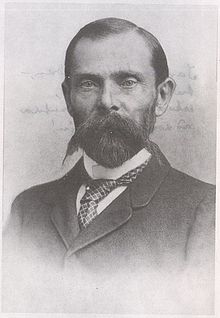Belarusian literature
Belarusian literature (Belarusian: Беларуская лiтаратура, romanized: Biełaruskaja litaratura) is the writing produced, both prose and poetry, by speakers (not necessarily native speakers) of the Belarusian language.
History
Pre-17th century
Belarusian literature was formed from the common basis of
18th and 19th centuries

Due to the cultural dominance of the
Separately in Belarusian literature is the Polish-language work of Adam Mickiewicz. His work is often attributed[by whom?] to the “Belarusian school” of Polish-language literature—representatives of this school,[citation needed] following Mickiewicz, wrote on the themes of the life of the Belarusian people, paying great attention to folklore. The influence of Mickiewicz can be traced in the works of Jan Barszczewski, Władysław Syrokomla, Vintsent Dunin-Martsinkyevich, Francišak Bahuševič.[6]
Early 20th century
A new period started after the
World War I
During
Interwar period
After the establishment of the
Post-war period
After the end of the
There are several Belarusian authors who have left Belarus and now work in emigration[where?] (for instance, Natalla Arsieńnieva and Aleś Sałaviej).[citation needed]
Among leading literary magazines of Belarus are Litaratura I mastaсtva (since 1932) and Połymia (since 1922).[citation needed]

In 2015, Belarusian investigative journalist and prose writer Svetlana Alexievich was awarded the 2015 Nobel Prize in Literature "for her polyphonic writings, a monument to suffering and courage in our time".[7][8]
Famous Belarusian writers
- 16th century
- 19th century
- Inter-war period
- Michaś Čarot
- Kuźma Čorny
- Jakub Kołas
- Janka Kupała
- Francišak Umiastoŭski
- After-war years
- Aleś Adamovič
- Uładzimier Arłoŭ
- Ryhor Baradulin
- Janka Bryl
- Vasil Bykaŭ
- Larysa Hienijuš
- Uładzimier Karatkievič
- Masiej Siadnioŭ
- Hienadź Klaŭko
- Ivan Šamiakin
- Sakrat Janovič
- Contemporary writers
References
- ^ Statute of the Great Duchy of Lithuania, 1588. Section 4 "Of Judges and Courts" (Розделъ четверътый. О судьях и о судех.). Article 1: "About the free election of the land government, judges, assistant judges and scribes in every land and poviet" (О вольномъ обиранью вряду земъского, судий, подъсудъков и писаров в кождой земли и поветѣ.).
- ^ Foreword to the Statute of the Great Duchy of Lithuania by Lev Sapieha.
- ^ Foreword to "Cathechesis" by Symon Budny.
- ^ Belarusian Historical Review, Vol. 11, No. 1-2 (20-21), 2004.
- ^ Zaprudnik, Jan. Belarus: At a Crossroads in History. Westview Press, 1993. pp. 60-65.
- ISBN 985-11-0016-1. Archive link
- ^ Blissett, Chelly. "Author Svetlana Aleksievich nominated for 2014 Nobel Prize Archived 2015-01-07 at the Wayback Machine". Yekaterinburg News. January 28, 2014. Retrieved January 28, 2014.
- ^ Treijs, Erica (8 October 2015). "Nobelpriset i litteratur till Svetlana Aleksijevitj" [Nobel Prize in literature to Svetlana Aleksijevitj]. Svenska Dagbladet. Retrieved 8 October 2015.
Svetlana Alexievich wins Nobel Literature prize, BBC News (8 October 2015)
